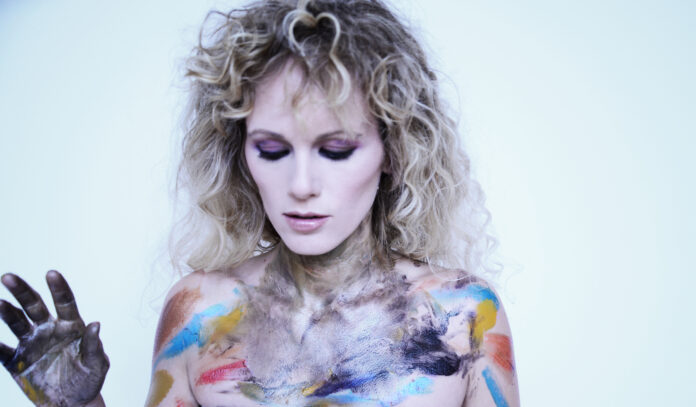( ENSPIRE Feature ) IVA Uses Her Immense Vocal Talent Alongside Personal Struggles to Shed Light on Important Female Issues
ENSPIRE Contributor: Keegan Kerns
IVA’s incredible range and vocal skills have earned her international acclaim. She has an astonishing ability to move from pop-style vocals to full operatic singing within the same song. IVA has been widely successful in many endeavors, including early studies of opera, time at Julliard, and a Fulbright Scholarship to study her ancestors’ music in Sweden, which she has incorporated into her own style. This has made her a unique crossover singer, songwriter, and voice teacher with a long and illustrious career in the music industry. Additionally, in a career over 15 years, IVA epitomizes women’s empowerment as a pioneer in the male-dominated music industry. Many promising young female artists are empowered, inspired, and even personally trained by IVA.
IVA has also bravely combined her own personal struggles with her music career to speak to her own experiences as a victim of domestic violence. Most notably, she speaks to this in her song “Immense Tenderness,” a cathartic song which, while subtle and quiet in some ways, spreads the message to women across the world that it is okay and even empowering to speak to your experience and truth.

ENSPIRE was able to talk to IVA about her musical upbringing and how that has influenced her career.
You’ve been steeped in many musical influences throughout your life, whether family members, teachers, or other famous artists. What figures would you consider the most important and influential in your development as an artist?
I don’t even know where to begin. My grandparents were amateur musicians, and there was always music in our home. My grandfather had been accepted to the conservatory to play the oboe, but he took another route because of the Great Depression and his father’s death. My father had an extensive, eclectic record collection that he would play for me as well. And our across-the-street neighbors loved classical music and exposed me to many amazing recordings, including “Songs from Liquid Days” by Phillip Glass. So, I had many influences along the way. I fell in love with the Beatles when I was five years old, and Paul became a spiritual father of sorts, which he is to this day. I have dreams where he guides me. In elementary school, I had a champion at Opera Delaware named Evelyn Swensson, who conducted and wrote children’s operas, and at my school, my choral teacher Jack Burnam helped me with every vocal competition, found me a voice teacher, and came to my house with a book called “The Musical Life” to let me know that he felt I could be a professional musician. Then I had so many incredible mentors – Don Marrazzo, Iwa Sörenson, Dorothy Irving, Kishti Tomita, and Steve Smith. I learned to write with some excellent musicians like Martin and Andreas Karlegård and Jorgen Löf. It’s been a beautiful journey, albeit a winding road, with many hands to hold, though I still feel the loneliness sometimes of being an artist.
Similarly, it seems you’ve been deeply involved in the music world for almost all of your life, being trained at opera singing from the age of 9 and later going on to Juilliard. Was there any point in your life where you didn’t feel like pursuing a career in music or was it always an important goal for you?
This is such a good question! I always wanted to pursue music, but I didn’t realize I could make a career of it until, at the end of college, I realized, “This is one of my greatest gifts. I could do this.” I had to audition twice for the conservatory to get into the place I wanted to go, and it took me a little while to get up to speed as I hadn’t done conservatory undergraduate training. As I got further into my career, I only ever damned my choice when I was having a tough time, like after the 2008 financial crisis when the Royal Opera of Stockholm had to cancel the opera I was in. But in my heart of hearts, I have always loved music and have always been compelled to make music. It’s one of my true loves.
You received a Fulbright scholarship to study your ancestors’ music in Sweden, where you lived for six years. How did that influence your perspective towards music and your career moving forward?
When I arrived in Sweden, I was welcomed with open arms as I was coming under the bona fides of the Fulbright. I was also genuinely interested in the country and its people. In New York, I’d felt like the competition was staggering, especially at my high-level conservatory, and my opportunities, while excellent ones, came amidst heartbreaking losses when I wasn’t chosen to sing where I had hoped. I was asked to do many concerts in Sweden, had excellent teachers, and garnered good reviews. What a relief to have the loving support of teachers and the press! But, even more importantly, my incredible teachers, Iwa Sorenson, Dorothy Irving, and Kishti Tomita, taught me how to experience my singing truly. To them, it wasn’t about “winning”; it was about living the singing with one’s entire being. Sweden had a great sense of peace that I had not found in New York, and it opened my mind and my heart. I had time to process my art and to listen to the inner voices that revealed my path. My creativity was ignited like never before, and I began writing more songs and discovering who IVA was and what she meant to me. I learned that my ancestors’ music was much about melancholy and loss, and I began to get in touch with those feelings within myself. I also felt a sense of how my life had sprung from those lived so many generations ago, and it gave me perspective on my family’s evolution and my life as part of that evolution. I also learned the practicality and the group mentality of the Swedes and understood how many people can work together with solidarity to create something beautiful. I have sought such partners with a similar perspective and personality ever since.
You’ve gone from a classical opera singer to an international pop star with several hit albums from “Ivolution” in 2009 to the more recent “Traitor” in 2019. From an outside perspective, it seems like these styles are pretty different. Is it easy to transition from one style to another, or has that been a skill you’ve needed to develop over time?
I love this question – thank you. The styles are quite different. I was always able to sing in both an opera voice and a pop voice, yet my pop voice needed to catch up with my opera voice in terms of development. The more recordings and concerts I did, the more my popular style voice grew in color and character. I have been playing with combining opera and pop since I began, and each album has been different. Now I play even more with switching into an operatic voice just for a moment in the middle of a song because it suits where the voice is going spontaneously. I used not to want to do that for fear of breaking out of the popular style, but it works well and feels better because I’m exploring instead of limiting myself. My friend and colleague Camille Natta have also helped me with method acting techniques that have brought my emotions to the fore, which has helped all of my singing become more spontaneous and direct. And I’ve discovered the magic of the Alexander Technique with Jean-Louis Rodrigue, which has helped the voice flow through me with new freedom.
In your personal life, you’ve dealt with some challenging circumstances, including domestic violence. You’ve spoken about this personally as well in your music, most notably in the song “Immense Tenderness,” which received widespread praise. Did you expect it to get the attention and praise it did, and what does it mean to know that your music carries such weight?
A few years ago, I was very frightened to open up about my experience with domestic abuse because I was ashamed and afraid of retribution from my abuser. Immense Tenderness wasn’t as much of full disclosure of my experience as the opera I am currently writing. For the listener to understand “Immense Tenderness,” they need to have a profound listening ability and perspective, and fortunately, the song has found that kind of audience. I hope the song reaches many more people because it spontaneously sprung out of me while I was in a very dark place, one of the darkest places of my life after I’d left my abuser. Yet again, music saved me. I am so lucky to have a voice to share and people to hear me out because it helps me process the difficult times and turn them into something I can experience with others, through song, from a place of inner strength.
You’ve planned on adapting “Immense Tenderness” into an operatic piece to be released in early 2024. Though you’re obviously one of the best-suited artists for this task considering your musical background, have you found there to be any difficulties in changing “Immense Tenderness” to this alternate format while still retaining its powerful messages?
I’d written some of the music for the opera and then realized that I needed to write the libretto to write more music. Writing the story and the opera’s words and getting clear on what I want to express, plus letting the story take over, has been daunting. I actually left the country to be able to clear my head, and it’s helping. When I’m in the States, I write the story, and I feel sick to my stomach. Domestic violence is a significant issue, and it is terrifying when one is in it. So I do feel some kind of deep angst as I craft the opera. I am not sure what is bothering me exactly, but there are plenty of things related to the subject and my experience, no? I want to get it right, and I’m so close to it. I’m not sure how it might be received, how I might be received, and I’m scared of God-knows-what. But I’m moving forward and working towards a reading of the libretto in the spring. And I can’t wait to write more music once I’m sure I’m telling the story that I wish to convey. I have astute support from the director Camille Natta, the music director Mila Henry, and the dramaturg Melisa Tien. And I worked with Beth Morrison Projects in their producer’s academy, and they supported me not only in telling my story but in how to tell it and get it out into the world. A project of this scale is something entirely new for me, and it’s going to take time, mindful planning, and financial support. The message will be even more powerful in an operatic, longer-form format, and I am just watching it unfold as I put one foot in front of the other—what a ride. Please continue to follow my musical journey on my website.
IVA is an inspirational figure in many ways and to many communities. Whether it is exploring her heritage through her pursuit and research of Swedish music through her Fulbright Scholarship, her success in a male-dominated industry. IVA’s ability to speak carefully yet powerfully to complex subjects like domestic violence can always break barriers and show individuals around the world not to doubt the strength inside themselves, even if they may be going through their darkest hour. IVA continues to inspire with her work, and we should both appreciate her pieces for their raw beauty and powerful messages. We should all be looking forward to the chance to see her operatic rendition of “Immense Tenderness.”
Related Articles: Pop Singer-Songwriter Mimoza Releases New Single “Young Queen”







